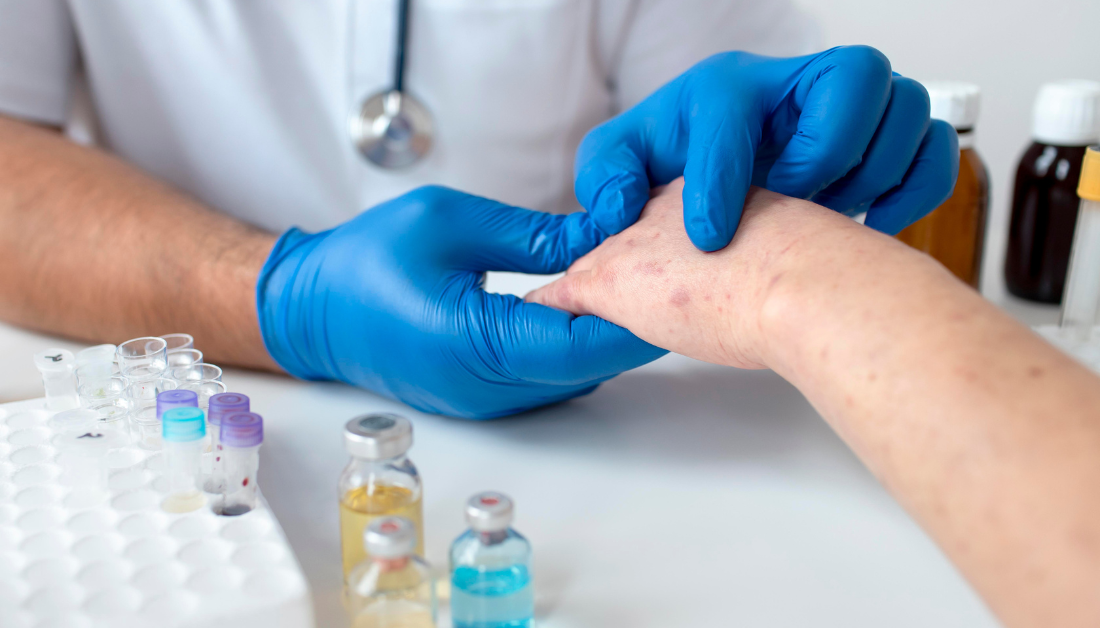

Congenital syphilis, a disease transmitted to babies during pregnancy, is on the rise globally, with between 700,000 and 1.5 million cases reported annually over the last eight years. Stillbirths, disability, and death can all result from the condition. A team of UC Davis pediatricians conducted a literature study, which was published in the journal Children, to shed light on this growing health hazard and provide viable solutions.
“We have seen many mothers delivering with perinatal syphilis who did not get syphilis treatment during their pregnancies,” said Deepika Sankaran, assistant professor of clinical pediatrics and first author on the paper. “Many were not diagnosed during pregnancy. Some were diagnosed but did not receive adequate treatment. As a result, their babies had to be admitted to the neonatal intensive care unit (NICU) for intravenous antibiotics.”
Syphilis is a potentially fatal bacterial illness that affects the skin, eyes, nerves, heart, liver, and brain. Syphilis infection can be transmitted from mother to fetus in any trimester by transplacental transmission or during delivery via direct contact with an infected lesion. Early detection and treatment are 98% effective in preventing congenital syphilis in babies.
This inherent difficulty in diagnosing can be exacerbated for certain women by a lack of prenatal health care due to poverty, substance addiction, or mental health difficulties.
“For many of these mothers, the first time they actually seek medical care is when they deliver, so there is no way even to test them,” Sankaran said. “They don’t have a primary care doctor or obstetrician, and when they get sick, they often go to the emergency room, which may be the only medical care they have before delivery. Even if they get tested, which is just a simple blood test, they may not show up for treatment.”
Babies suffer greatly as a result of this cycle. Because syphilis can spread to the brain, babies are frequently subjected to lumbar punctures to test their cerebrospinal fluid for germs. If the test comes back positive, they may have to stay in the NICU for the next 10 days to receive antibiotics. Babies who are not treated may develop long-term difficulties.
The authors, who include Elizabeth Partridge, associate professor of pediatric infectious disease, and Satyan Lakshminrusimha, chair of the Department of Pediatrics, senior author, and medical illustrator, highlight that this is a global issue. They examined papers from China, Brazil, and other countries and discovered that syphilis rates were frequently influenced by public health efforts, local customs, availability to care, and other variables.
Another challenge is identifying newborns at risk of congenital syphilis quickly since doctors are not always looking for it. Toxoplasmosis, various pathogens, rubella, CMV, and herpes are the acronyms for intrauterine infections. The authors propose changing this abbreviation to SCORTCH: syphilis, CMV, other, rubella, toxoplasmosis, chickenpox, herpes, and blood-borne viruses.
“Because congenital syphilis is the great masquerader, we should be testing pregnant women if we see any signs of it,” Sankaran said. “If a high-risk person comes to the emergency room, they should be screened. If they are diagnosed with the disease, we must find ways to get them treated so it is not passed on to the baby.”
According to Sankaran, the public health system must discover better ways to optimize follow-up for women with perinatal syphilis, their partners, and their babies. Waiting passively for them to seek medical attention may not lower danger. She considers community engagement and education to be critical components of any effective approach.
“The No. 1 thing that must happen is political backing for more aggressive public health interventions to catch the disease early,” said Sankaran. “With outreach, we can seek out high-risk women, treat them and prevent syphilis transmission to their babies.”
more recommended stories
 Healthy Habits Slash Diverticulitis Risk in Half: Clinical Insights
Healthy Habits Slash Diverticulitis Risk in Half: Clinical InsightsHealthy Habits Slash Diverticulitis Risk in.
 Caffeine and SIDS: A New Prevention Theory
Caffeine and SIDS: A New Prevention TheoryFor the first time in decades,.
 Microbial Metabolites Reveal Health Insights
Microbial Metabolites Reveal Health InsightsThe human body is not just.
 Reelin and Cocaine Addiction: A Breakthrough Study
Reelin and Cocaine Addiction: A Breakthrough StudyA groundbreaking study from the University.
 Preeclampsia and Stroke Risk: Long-Term Effects
Preeclampsia and Stroke Risk: Long-Term EffectsPreeclampsia (PE) – a hypertensive disorder.
 Statins and Depression: No Added Benefit
Statins and Depression: No Added BenefitWhat Are Statins Used For? Statins.
 Azithromycin Resistance Rises After Mass Treatment
Azithromycin Resistance Rises After Mass TreatmentMass drug administration (MDA) of azithromycin.
 Generative AI in Health Campaigns: A Game-Changer
Generative AI in Health Campaigns: A Game-ChangerMass media campaigns have long been.
 Molecular Stress in Aging Neurons Explained
Molecular Stress in Aging Neurons ExplainedAs the population ages, scientists are.
 Higher BMI and Hypothyroidism Risk Study
Higher BMI and Hypothyroidism Risk StudyA major longitudinal study from Canada.

Leave a Comment